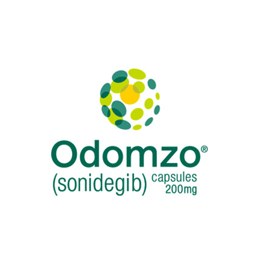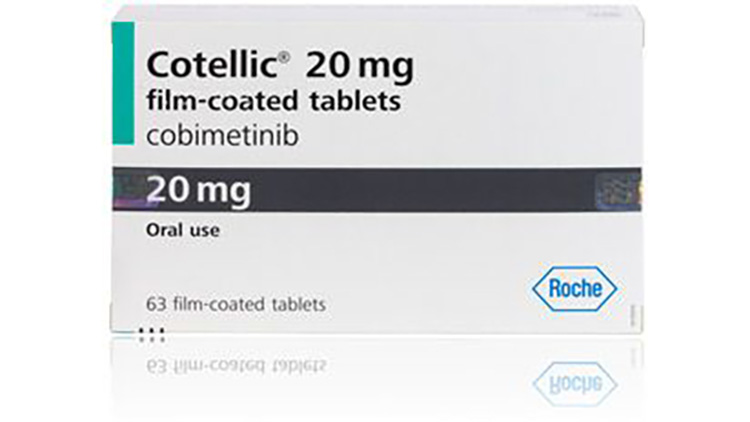Odomzo (sonidegib) vs Cotellic (cobimetinib)
Odomzo (sonidegib) vs Cotellic (cobimetinib)
Odomzo (sonidegib) and Cotellic (cobimetinib) are both oral medications used in the treatment of advanced cancers, but they target different signaling pathways within cancer cells. Odomzo is a hedgehog pathway inhibitor approved for the treatment of locally advanced basal cell carcinoma (BCC) that has recurred following surgery or radiation therapy, or for patients who are not candidates for these therapies. In contrast, Cotellic is a MEK inhibitor used in combination with vemurafenib, a BRAF inhibitor, for the treatment of metastatic melanoma with a BRAF V600E or V600K mutation, and is not indicated for BCC. The choice between these medications would depend on the specific type of cancer a patient has and the presence of certain genetic mutations.
Difference between Odomzo and Cotellic
| Metric | Odomzo (sonidegib) | Cotellic (cobimetinib) |
|---|---|---|
| Generic name | Sonidegib | Cobimetinib |
| Indications | For the treatment of adults with locally advanced basal cell carcinoma (BCC) that has recurred following surgery or radiation therapy, or those who are not candidates for surgery or radiation therapy. | Used in combination with vemurafenib for the treatment of patients with unresectable or metastatic melanoma with a BRAF V600E or V600K mutation. |
| Mechanism of action | Inhibits the Hedgehog signaling pathway by binding to and inhibiting Smoothened, a transmembrane protein involved in Hedgehog pathway activation. | MEK inhibitor which works by inhibiting mitogen-activated protein kinase enzymes MEK1 and MEK2. |
| Brand names | Odomzo | Cotellic |
| Administrative route | Oral | Oral |
| Side effects | Includes muscle spasms, alopecia, dysgeusia, fatigue, nausea, musculoskeletal pain, diarrhea, decreased weight, decreased appetite, myalgia, abdominal pain, headache, vomiting, and pruritus. | Includes diarrhea, photosensitivity reaction, nausea, vomiting, and increased liver enzymes. |
| Contraindications | Should not be used in patients with hypersensitivity to sonidegib or any of its components. | Should not be used in patients with hypersensitivity to cobimetinib or any of its components. |
| Drug class | Hedgehog pathway inhibitor | MEK inhibitor |
| Manufacturer | Sun Pharmaceutical Industries, Inc. | Genentech, Inc. |
Efficacy
Odomzo (Sonidegib) Efficacy in Treating Skin Cancer
Odomzo (sonidegib) is a medication approved by the U.S. Food and Drug Administration (FDA) for the treatment of adults with locally advanced basal cell carcinoma (BCC) that has recurred following surgery or radiation therapy, or those who are not candidates for surgery or radiation therapy. As an inhibitor of the hedgehog signaling pathway, which is active in BCC, sonidegib disrupts the molecular processes that contribute to the growth of cancer cells. Clinical trials have demonstrated its efficacy in shrinking tumors or preventing them from growing. In the pivotal BOLT trial, sonidegib showed a significant response rate in patients with locally advanced BCC, with some patients achieving a complete response.
Patients treated with Odomzo have shown varied response durations, with a subset experiencing long-term disease control. However, the efficacy of sonidegib can be influenced by several factors, including the genetic profile of the tumor and the extent of disease progression. It is important for patients to be monitored for side effects and for the treatment to be managed by healthcare professionals experienced in the use of anticancer medications.
Cotellic (Cobimetinib) Efficacy in Treating Skin Cancer
Cotellic (cobimetinib) is another targeted therapy that has been approved for use in combination with vemurafenib for the treatment of patients with unresectable or metastatic melanoma with a BRAF V600E or V600K mutation. The combination of cobimetinib, a MEK inhibitor, with vemurafenib, a BRAF inhibitor, has been shown to enhance anti-tumor activity compared to vemurafenib alone. This synergistic effect is due to the dual blockade of the MAPK pathway, which is often activated in melanoma due to BRAF mutations.
In clinical trials, the combination of cobimetinib and vemurafenib has led to improved progression-free survival and overall survival rates compared to vemurafenib monotherapy. The coBRIM study, for instance, demonstrated a significant increase in median progression-free survival for patients receiving the combination therapy. As with all cancer therapies, the response to cobimetinib can vary between patients, and treatment must be tailored to individual needs and monitored for potential adverse reactions. It is critical for patients to undergo testing for BRAF mutations to determine their eligibility for treatment with cobimetinib in combination with vemurafenib.
Regulatory Agency Approvals
Odomzo
-
European Medical Agency (EMA), European Union

-
Food and Drug Administration (FDA), USA

-
Therapeutic Goods Administration (TGA), Australia

Cotellic
-
European Medical Agency (EMA), European Union

-
Food and Drug Administration (FDA), USA

-
Therapeutic Goods Administration (TGA), Australia

Access Odomzo or Cotellic today
If Odomzo or Cotellic are not approved or available in your country (e.g. due to supply issues), you can access them via Everyone.org.
How it works

Make an enquiry
Choose the medicine you want to buy, answer a couple of questions, and upload your prescription to speed things up. We’ll get back to you within 24 hours.


Make an enquiry
Choose the medicine you want to buy, answer a couple of questions, and upload your prescription to speed things up. We’ll get back to you within 24 hours.


Breeze through the paperwork
We'll guide you through the required documents for importing unapproved medicine, ensuring you have all the necessary information.


Get a personalized quote
We’ll prepare a quote for you, including medicine costs and any shipping, administrative, or import fees that may apply.


Receive your medicine
Accept the quote and we’ll handle the rest - sourcing and safely delivering your medicine.

Some text on this page has been automatically generated. Speak to your physician before you start a new treatment or medication.
Let's talk
If you have any questions, call us or send us a message through WhatsApp or email:
Contact us




